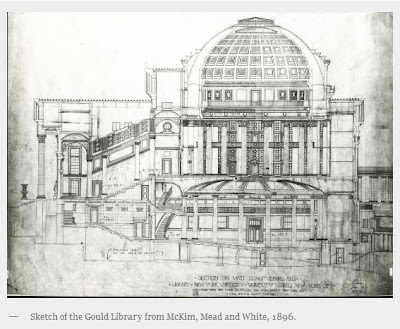________________________________________________________
NYU's Interesting History and Architecture
 |
| Door of Gould Library |
 <- Albert Einstein visiting the Hall of Fame with Elmer Ellsworth Brown, NYU Chancellor from 1911-1933.
<- Albert Einstein visiting the Hall of Fame with Elmer Ellsworth Brown, NYU Chancellor from 1911-1933.
Sitting atop a hill in the Bronx, on one of the highest spots in New York City, overlooking the Harlem River, is the former University Heights campus, the one time home of New York University’s undergraduate college, University College of Arts and Science and the School of Engineering. From 1894-1973, the campus earned a reputation for its daring and impressive architecture. With buildings as classical as the Parthenon and as modern as the Guggenheim, University Heights remained at the forefront of the latest trends in architecture. In 1973, New York University, faced with financial hardship, chose to sell the Heights and it became the home of Bronx Community College. Almost forty years later, the campus remains roughly the same, keeping the history of NYU University Heights alive.
Stanford White's Gould Memorial Library, a majestic structure reminiscent of Ancient Rome, is considered a lost treasure today. Few know of its existence, but for a number of decades the library was considered the most impressive building in the Bronx. When designing the Gould Memorial Library, White envisioned a grand classical structure with a large stairway, columns, arched openings, decorative details and most significantly, a dome. The rotunda would become the defining feature of his library.
The Hall of Fame for Great Americans at Bronx Community College, the original "Hall of Fame" in this country, is a New York landmark institution founded in 1900
The Hall of Fame 630-foot open-air Colonnade to honor prominent Americans who have had a significant impact on this nation's history. The Hall of Fame was originated by Dr. Henry Mitchell MacCracken, Chancellor of New York University from 1891 to 1910, and was designed as part of the construction of an undergraduate college of that university.
Built in a sweeping semicircular Neo-Classical arc with wings at either end, it provides a panorama across the Harlem River to the Cloisters in Fort Tryon Park and beyond to the Palisades. It is a unique and patriotic reminder that this country's phenomenal growth has been due to the vitality, ingenuity, and intellect of these individuals.
Stanford White's Gould Memorial Library, a majestic structure reminiscent of Ancient Rome, is considered a lost treasure today. Few know of its existence, but for a number of decades the library was considered the most impressive building in the Bronx. When designing the Gould Memorial Library, White envisioned a grand classical structure with a large stairway, columns, arched openings, decorative details and most significantly, a dome. The rotunda would become the defining feature of his library.
The Hall of Fame for Great Americans at Bronx Community College, the original "Hall of Fame" in this country, is a New York landmark institution founded in 1900
The Hall of Fame 630-foot open-air Colonnade to honor prominent Americans who have had a significant impact on this nation's history. The Hall of Fame was originated by Dr. Henry Mitchell MacCracken, Chancellor of New York University from 1891 to 1910, and was designed as part of the construction of an undergraduate college of that university.
Built in a sweeping semicircular Neo-Classical arc with wings at either end, it provides a panorama across the Harlem River to the Cloisters in Fort Tryon Park and beyond to the Palisades. It is a unique and patriotic reminder that this country's phenomenal growth has been due to the vitality, ingenuity, and intellect of these individuals.
Here's the LINK to a fantastic site on the early history.
 *College
basketball, Happy Hairston was born in Winston-Salem, NC, May 31,1942;
he died in Los Angeles, CA, May 1, 2001. A 6’7” forward, Harold Hairston
was a teammate of Barry Kramer for three seasons and helped N.Y.U. to a
55-20 record from 1961-64. He missed the first half of his junior year
(1962-63) for academic reasons but still finished his career second in
scoring (1,346) and fourth in rebounds (793) for the Violets. Hairston
had two 38-point games against Holy Cross at the Garden in successive
years (Feb. 14, 1963, and Feb. 6, 1964). He later had a successful
N.B.A. career, primarily with the Los Angeles Lakers.
*College
basketball, Happy Hairston was born in Winston-Salem, NC, May 31,1942;
he died in Los Angeles, CA, May 1, 2001. A 6’7” forward, Harold Hairston
was a teammate of Barry Kramer for three seasons and helped N.Y.U. to a
55-20 record from 1961-64. He missed the first half of his junior year
(1962-63) for academic reasons but still finished his career second in
scoring (1,346) and fourth in rebounds (793) for the Violets. Hairston
had two 38-point games against Holy Cross at the Garden in successive
years (Feb. 14, 1963, and Feb. 6, 1964). He later had a successful
N.B.A. career, primarily with the Los Angeles Lakers.
_______________________________________
Some interesting old images below as well as a map showing the location of NYU's uptown campus, now Bronx Community College.





